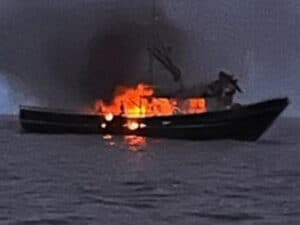
VIDEO: Japanese consortium moves ahead on all-electric tanker project
Written by Nick Blenkey
All electric tanker will have a base battery capacity of 3,500 kWh
Coastal shipping in Japan faces structural issues that include aging vessels and an aging seagoing workforce leading to a shortage of mariners. Meantime, the industry is under pressure to reduce emissions of greenhouse gases (GHGs) as one of Japan’s measures to address climate change.
A newly formed consortium of seven companies sees electric vessels as the solution to these increasingly urgent issues.
Back in August last year we reported that four leading Japanese companies — Asahi Tanker Co., Ltd., Exeno Yamamizu Corporation, Mitsui O.S.K. Lines Ltd., and Mitsubishi Corporation – had set up a new company, e5 Lab. Inc. (e5 Lab) to work to develop and promote the greater use of clean modes of marine transport. Now those companies have been joined by three more – Idemitsu Kosan Co., Ltd., Tokio Marine & Nichido Fire Insurance Co., Ltd., and Tokyo Electric Power Company —to establish the new “e5 Consortium.”
As the first phrase of the project, the consortium plans to launch the world’s first zero-emission electric tanker, powered by large-capacity lithium ion batteries, in March 2022 .
With a base battery capacity of 3,500 kWh, the vessel will be the first of two 499 gt marine fuel supply vessels that Asahi Tanker Co. plans to operate in Tokyo Bay. It will have an overall length of 62 meters, beam of 10.30 meters, draft of 4.15 meters and about 1,300 cu.m tank capacity.
Asahi Tanker Co. says that “various digital tools, including various automated equipment and IoT (Internet of Things) will be adopted to reduce the burden of crew onboard work and improve operating efficiency.”
Why “e5”? That stands for “electrification,” “environment,” “evolution,” “efficiency,” and “economics.”




